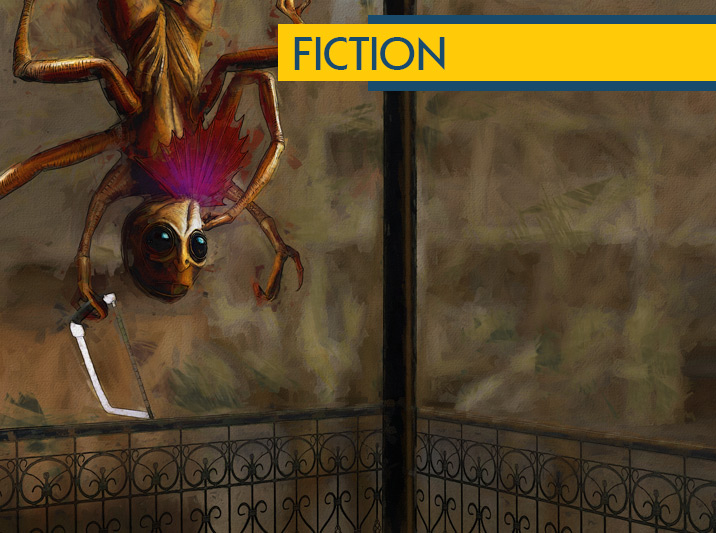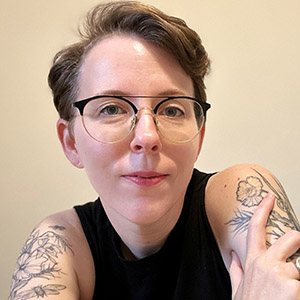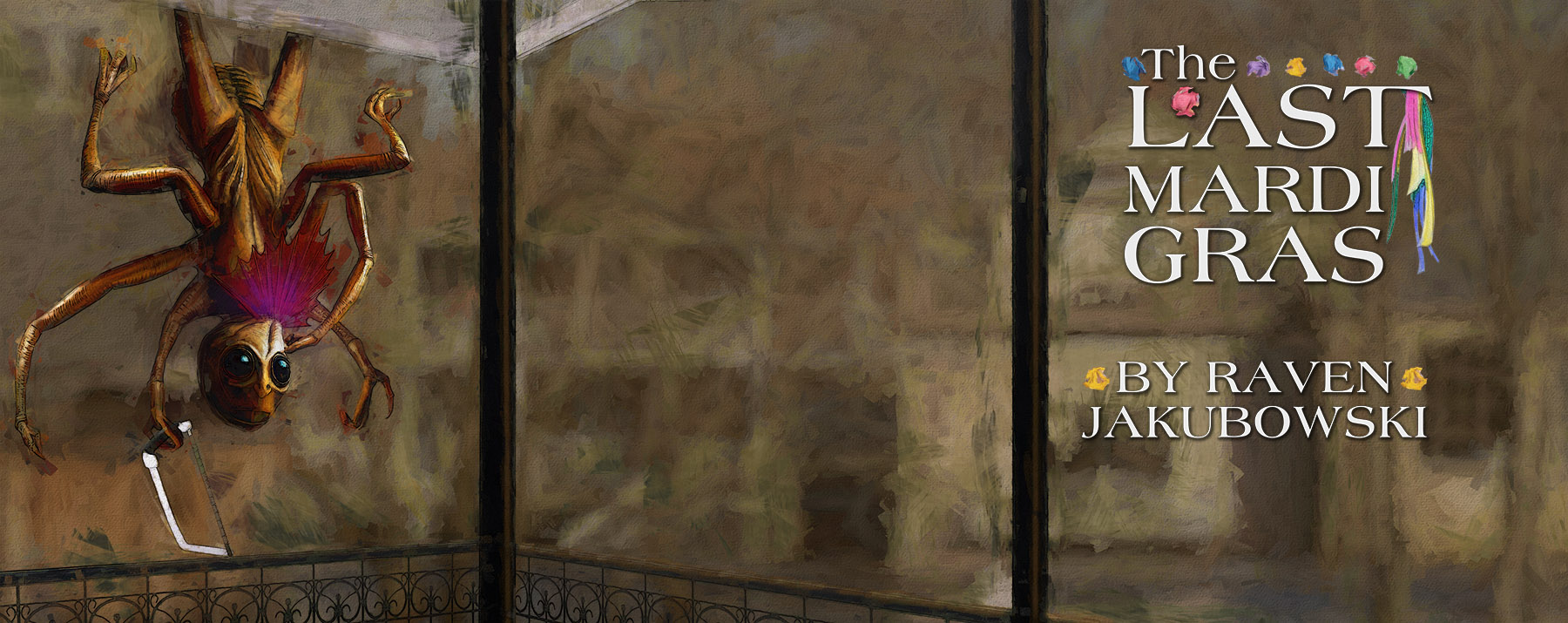
It isn’t the noise of the water lapping between the walls on the first floor, nor is it the sound of the building settling a little more into wet decay. Helen had long ago incorporated those sounds into her universe and no longer woke for them.
She lay in bed for a few moments, eyes open, focused on the brown water stain spreading slowly through the plaster above the bed. She would need to fix the roof in the next month, or the summer storms would have the ceiling down. She recognized the sound, suddenly: a hack saw.
She swung her legs over the side of the bed and wiggled her feet into her threadbare slippers, a practiced maneuver, but not a quick one. She was well past the age of springing out of bed. It was a good morning, though, not too humid yet. Her old chenille robe was hanging from the end of the four poster, and she pulled it on for modesty’s sake. She took the shotgun from the moldering elephant foot umbrella stand by the bedroom fireplace, used the barrel to twitch aside the yellowed lace curtains of the French doors in the front room. A nucha, still young by the delicate look of his neck ruff, ten years old at the most, was hanging by his feet from the roof of the porch, patiently sawing through the decorative ironwork with the handsaw clutched in one of his forelimbs. He was spindly, probably malnourished judging by the way his intradermal plating rippled and buckled over his frame. The brilliant scarlet and violet of his neck reminded her of Steven when he was young.
She nearly always left the door unlocked these days, and she pushed it open silently, gun still trained on the nucha.
“I’d come down from there if I was you, son. I’d hate to see you get hurt.”
Startled, the nucha swung his head around in that disconcertingly one-eighty way they had, then held his forelimbs out in a gesture of surrender.
“Okay, lady, okay. Don’t shoot, please, I didn’t know about anybody owning this place, thought it was all empty down here.” Keeping his hands visible, he shimmied his back legs down one of the iron supports and onto the porch. “I’ll leave; I can go now. I got a boat just down there at the end of the street, right?”
Helen raised an eyebrow. “What’re you doing scavenging down here, anyway?”
“I hear there’s tons of metal down here. Scrap Man’ll give good money for iron, steel, all kinds. I figure nobody here, maybe I can find a boat, come down and take it, okay? But you own this, so it’s fine, I’ll go.”
“You here by yourself?”
“Yeah, I come alone. I get the boat from Herman up at Red Dock, real cheap, me and my brother patched it up pretty good. I come down last night.” The kid was getting antsy.
Helen tapped her foot lightly, debating. His black eyes, too, with their tiny yellow flecks, reminded her of Steven.
“What’s your name?” she asked.
“Fernand.” He looked up at her, waiting for the next question.
“You may as well come in for breakfast,” she said, finally, lowering the gun.
“What?”
“If you’re hungry, I’ll make us both breakfast.”
“You ain’t mad? About your house?”
“No. If you try stealing my porch rails again, then I’ll be mad. There’s plenty of empty houses around here, ain’t your fault you picked the only one wasn’t.”
She walked inside, leaving the door open behind her, and the boy followed her inside meekly.
“Eggs alright with you? The girls have been laying plenty lately, I’ve got some to spare.” She docked the shotgun in the elephant leg and shuffled into the kitchen, started stoking the fire in the stove, put the kettle on.
“Eggs is good,” the boy said, looking around curiously at the knick-knacks in the living room, the collection of mismatched furniture clumsily covered with thick afghans. He hovered in the entrance to the kitchen, watching her maneuver slowly but assuredly in the small space, juggling plates and glasses. The kitchen table was covered in wire-mesh racks drying leaves and flowers.
“We’ll eat in the living room,” Helen said, catching him staring at the table. “Clear a spot on the coffee table? Just set the books on the floor, wherever is fine. I’ll get to them later.”
When she came in, plates in hand, she found the boy peering intently at the photos hung on the wall above the couch.
“Who’s this?” he asked, pointing.
Helen set the mismatched dishes carefully on the coffee table, then looked over his knobby shoulder.
“That’s Steven. He was my son-in-law.”
“Your daughter married a nucha?” Fernand sounded surprised.
“Mm-hmm.” Helen gestured for him to sit, brought apple butter and a knife out of the kitchen.
“They were raised together,” Helen said as they ate. “More or less. Steven’s parents disappeared in the Greentown riots. They lived down the street from us at the time. One of his fathers was a social worker. Virgie. He was a good friend of mine.”
Fernand squinted at her. “How old are you?”
Helen laughed. “Old enough that that question doesn’t bother me anymore. Seventy-two.” She spread apple butter on her toast. “How old are you?”
“Eight.” He shrugged.
“Ah. So you’ve been on your own for a little while?”
“Yeah. Used to live with my brother. He works for Housing, divvies up land.”
“Steady work?”
“Okay.” He paused, added more salt to his eggs. “Not enough jobs for me, though. I figure I’ll be a scrapper, go where the metal is, take it back to the Scrap Man, now there’s nobody living down here anymore. ‘Cept you.”
“Except for me.” Helen sighed.
They ate in silence for a few moments. Fernand looked around him with interest between bites. More than once, Helen caught him studying her with his depthless eyes.
“Why you live down here, anyways?” he asked.
“Oh, all the reasons people stay anywhere. Sentiment. Habit. Stupid reasons like that.” She wiped her hands on her cloth napkin with finality. “Alright. That was lovely.”
She stood up and gestured him over to the French doors.
“See that white roof over there?” She pointed.
Fernand nodded.
“Just behind that, you can’t really see it, there’s the LaRue house. Been abandoned for a little while but not too picked over. You should be able to get the railings off pretty easily.”
She turned to go back inside, paused, looked over her shoulder at him. “If you happen to find any glass bottles or jars, I’d be happy to pay for them. Extra if they have a lid. I can’t get very far myself these days.”
“Okay,” he said, clambering down the side of her house. “Thank you for breakfast, Ma’am.”
“It’s Helen,” she called back. “And next time, knock.”
She was on the flat roof of the house clearing the drainage channels around the vegetable beds when she heard her name being called. It startled her, but she recovered quickly, leaning her head over the eaves to see who it was.
The nucha boy was in the yard, thigh deep in the high tide water, a bulging cloth bag slung over one shoulder. He was peering up at the porch expectantly, one stumpy hand held up to shield his eyes from the bright morning sky.
“I’m up here, Fernand,” she called down, and he looked up and gave her one of the wide, uncanny smiles characteristic of the nuchan. “Shall I come let you in?”
“Nah, I’ll come to you,” he said.
“Of course.”
He adjusted the strap of his bag and pulled himself up the side of the building, arm over arm, using his middle limbs for balance. He left little muddy prints on the dirty white siding as he went.
She stood back as he hoisted himself onto the roof.
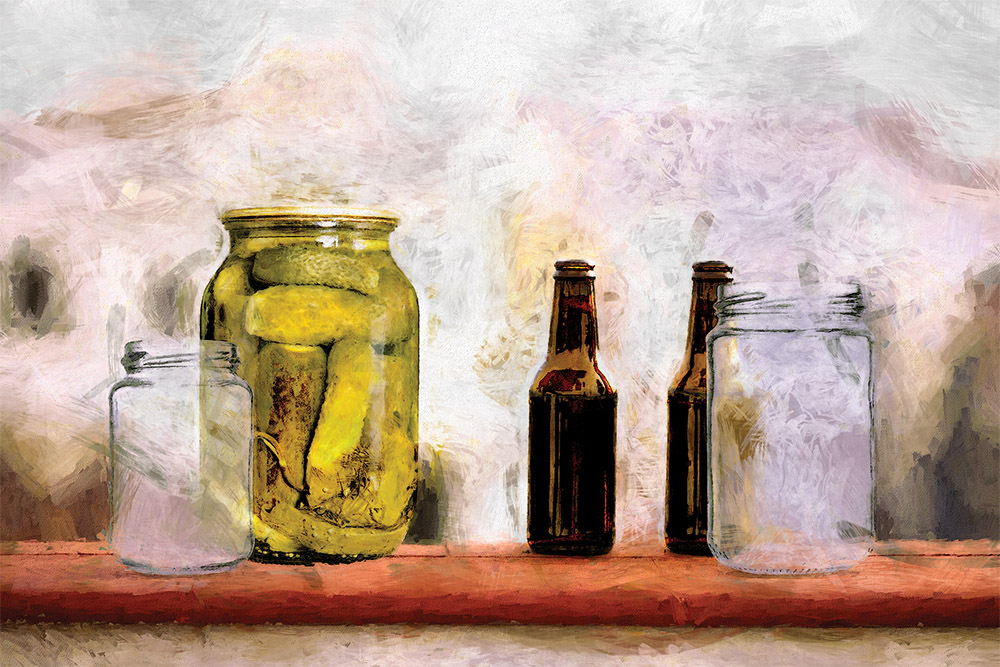
“I found you jars,” he said, digging into the bag with a clinking noise. “Whole stash in a house up the canal.”
He fished the jars out one by one and set them in a row on the edge of one of the raised beds, shuffling them back and forth until they were arranged by size. She watched him work patiently. He stood back and admired them, finished.
“They’re lovely. And three still with lids, too.” She squeezed his shoulder appreciatively, careful to avoid his neck ruff. “The wax beans are ready to put up, you’re just in the nick of time with these. Come in?”
“Yeah, okay,” he said, following her across the roof to the stairs, then down and inside through the kitchen.
“Are you hungry?” she asked.
“Some. Tired,” he said.
“Are they still taking Jackson scrip in Red Dock?” she asked, setting her gardening gloves on the kitchen counter.
“Yeah, but not everybody. Some places just barter now.”
She grunted. “I expected as much. So, how’d you like to be paid for the jars?”
“Scrip is alright. Travels easier.”
“Are you planning on murdering me in my sleep?”
“What?!” He exclaimed, and she chuckled.
“Just some little old lady humor. Come on, I’ll get your money.”
She led him to the front room and opened the cabinet under the old Victrola, easing out a battered cookie jar full of tin and plastic coins. She counted them out carefully, generously, two tinnies for each jar and an extra six clickies for the lids.
“Here,” she put the money in his right middle hand, so as not to offend him.
“What is that?” he asked.
She followed his gaze. “It’s a record player. It plays music. This one does it without electricity.”
“Never seen one.”
“They weren’t common even when I was a girl. This one was an antique when my grandfather bought it. It comes in handy now, though, when I…when it gets too quiet.”
He touched the cabinet reverently. “Can I hear?”
“If you turn the crank. What would you like to listen to?”
“Anything.”
She pulled out the first sleeve in the cabinet. “‘Doctor Jazz’, Jelly Roll Morton. The crank’s here, give it a good wind.” She set the record on the turntable and waited for him to finish, then started the music playing.
She settled back in the couch and watched Fernand’s face. Reading nucha expressions was a skill she’d worked very hard to acquire in her years as a nurse, the first human nurse in the county to become qualified to treat nucha physiognomy. He was focused intently on the sounds. When the song was over, he turned and looked at her sharply.
“Can I hear more?”
“Don’t they play jazz anymore?” she asked, softly, as she slipped “When the Saints Go Marching In” onto the turntable and he dutifully wound the coil.
He shrugged. Helen wondered idly how long it had taken for the nuchan to adopt the broader human body language.
They let the song play through without speaking. When it was done, Fernand got up and wound the crank, then looked at her expectantly.
“Here.” She showed him how to handle the record, how to lower the needle.
“Thank you.”
When the next song was done, he moved the needle back and began playing it again.
“I need to finish up in the garden,” she said. “Will you stay for supper?”
“Okay,” he said.
The next time Fernand visited, he brought three jars and two glass bottles, all in good condition. He also brought a large catfish, freshly caught.
“Lovely,” Helen said. She let him gut the fish and showed him how to dredge it in cornmeal and fry it in the pan.
After they ate, he asked to play the Victrola again. She mended a hole in his shirt while he looked again at the pictures on the wall.
“When did Steven die?” he asked suddenly.
She was quiet for a moment.
“Two years ago.” She didn’t look up from her darning.
“Oh.” He didn’t apologize. Nuchan never shared human taboos around death and dying.
“He was thirty,” she said. “A good, long life. It was just the two of us for a little over a decade.”
“What about your daughter?”
Helen handed his shirt back to him, hole repaired.
“Terran fever. She was twenty-nine. You know, when she and Steven were married, everyone tried to warn them. ‘You’ll outlive him,’ they told her. ‘Nuchan’s have less than half a human lifespan.’ But she was determined, and so was he. She was always that way, though. Stubborn. Romantic. She said she’d rather have a few years of true love than a lifetime of compromise.”
She got up and retrieved an old-fashioned photo album from the bookshelf.
“Their wedding is in this one.”
Fernand sat next to her and looked at the pictures as she turned the pages.
“I guess nuchan-human marriages still aren’t too common?” she asked.
He shook his head. “Never seen one.”
“It’s hard. The lifespan problem, the cultural differences. And of course, they have to give up the thought of children, especially with the nuchan attitude on adoption.”
He nodded.
“What’s this?” he asked, pointing at a picture.
“Oh, I forgot those were in here. It’s the last Mardi Gras, before they began relocating people. It was right after the Greentown riots. The city fathers talked about canceling it. There was all the unrest, the orders had come down to begin forced evacuations, and the first strain of fever had just appeared in Memphis. Tradition was too strong, though. I think they knew the people would have gone ahead and done it anyway, with or without permission.” She chuckled, turned the page.
“This was our float,” she said. “I was a nurse then, at St. Joan. We all pooled our money and built it on our off time. Genevieve’s husband had a warehouse, and we put it all together there.” She pointed at one picture, a riot of color, paper flowers and streamers, and in the middle a smiling young Helen, just a little worn around the edges, her arms thrown around the shoulders of a grinning teenager and an adolescent nucha. “Marisol and Steven, just after he’d moved in with us. They rode with me.
“Everyone knew that this was it. The levees were doomed, the water rising. Already the land by the canals was underwater. It was wild, more than usual. People came in from all over, the train yards were totally packed. People were sleeping in tents and on roofs; there was no vacant room in the whole city. They set up shelters for people on the airport runways, since it was just wasted space with everything grounded. There was never a party like it in history. The last one.”
Fernand leaned close to the pictures, tracing outlines with his stubby fingers. He looked very closely at the floats, the costumes, the pictures of crowds leaning over balconies, packing the sidewalks with rainbow chaos.
“It’s…beautiful,” he said, finally.
“It really was,” she said.
Fernand helped her hang laundry from the lines on the roof, set so the dripping of the clothes would water the garden beds. The chickens clucked contentedly to themselves in the corner coop.
“Ain’t you lonely?” he asked when they were done.
“Sometimes.”
“Why don’t you leave?”
She shrugged. “I don’t want to.” She eased herself down into a cane chair in the shade of the chimney. “We were out of the flood evac area here, at least at first. By the time they realized how far the water was going to rise, they were having problems finding room for people they’d already moved. Steven and Marisol and I stayed under the radar.”
He looked at her blankly.
“Sorry. Old expression. We stayed out of the way, and they ignored us. For a while the government made regular supply runs to the old depot, but after the last outbreak of fever killed so many of the holdouts, they stopped sending supplies, forgot about us. It was just as well.”
“Where do you get the flour, cornmeal, things?”
“Oh, free traders still come by once in a while. Scavengers, too, who’re willing to trade if there’s someone going to put up a fight. There’s a regular, Chris something, comes through every four months or so. He’s due here soon enough. He’s usually got some dry goods to barter for eggs or metal.”
Fernand looked out over the shallow water, down to where the old Deveraux house had sunken onto its piles last month. Boards stuck out of the mud like disjointed bones, the roof sliding down into the muck like the skin off a chicken breast.
“When is Mardi Gras?” he asked, suddenly.
“Spring. February usually. It’s different every year.”
“Why?”
“It depends on a religious holiday.”
“Oh.” Fernand suddenly turned his back to her. He was uncomfortable. Helen sat quietly, waited.
“There are missionaries in Red Dock,” he said.
“I bet.”
“They…” Fernand hesitated. “It’s confusing.” He dropped to a crouch and crossed his middle arms behind him nervously. “They talk about love and hate and punishment and sin. What does God want, anyhow?”
They sat in silence for a while. Gulls flew overhead, griping about the wind.
The nuchan didn’t bring religion with them to their new world.
“I think God makes people feel less lonely,” Helen said finally. “Then they want to share it that feeling, and if a person isn’t lonely for God they get suspicious. Maybe jealous.”
“I was born here. My fathers were born here. I am an Earth person, like you, yeah?”
“I think so.”
“So how come I don’t get it? Why don’t I feel lonely like you do? How come I’m not scared of death like humans? How come I’m not just like you inside? I grew up with humans, I grew up on Earth, but I’m not an Earth person. How deep am I nuchan?”
Steven had asked the same questions, struggled with the same things. Helen got up from the chair and knelt by Fernand, favoring her right side where the knee was swollen.
“You are nuchan. But you’re also Fernand. You aren’t your brother. You aren’t me. There are humans who don’t fear death, who aren’t lonely for God, who struggle with the same things. And maybe somewhere there are nuchan who are lonely or scared. It’s being a person. It doesn’t matter who you came from or who your parents are or where they came from.”
“Maybe I was lonely,” he admitted, “But I didn’t know what it felt like. Until it was gone.” His ruff blanched a pale white.
Helen dusted the pictures on the wall, one at a time, carefully cleaning out the grooves in the frames, straightening them when she was done. The door to the porch was open, a hot breeze blowing in like the heat off an oven. She missed Fernand. After their last talk he’d run off; it’d been two weeks now.
She wound the phonograph, tenderly, careful not to strain her wrists, put on “Tiger Rag.” The tinny sounds filled the room. There was a green cast to the dry skin of her elbows. She rubbed at it absently, thought of Marisol.
She remembered the time when she still kept a messy house. Steven would follow her around anxiously, carefully restoring misplaced things, straightening picture frames, everything in its place. And when he was gone, how she would sit for hours on the porch, or pull on her father’s old waders and go for a slog around the old neighborhood. She would track mud spitefully through the houses of the neighbors she’d hated, the ones who kicked their dogs, the ones with mean children or loud parties. The houses were all empty by then.
She’d started keeping her house clean. There was always something to tidy. The dust that crept up, the damp, the mildew. She’d used bleach, vinegar, all from the plastic bottles that she and Steven had stockpiled together.
Today she took each book off the shelves in the living room and dusted down the tops and spines, replaced them on the shelf. She could clean every day left in her life and never feel clean enough anymore. She had read every book. She had listened to every record. Everything she did anymore felt like a countdown.
The Victrola wound down. She sat on the couch. She was hot, and she could smell her sweat over the tang of the vinegar, saltier than usual. Fever.
So the countdown was shorter. It was a relief. Seventy-two… no, seventy-three years now. More than two of them totally alone. She’d lost a daughter. Lost a son. Lost her friends, her neighbors. And before all that, lost her father, her grandfather. Seventy-three years and all she had to show for it was her intimate, clinical, well-qualified knowledge that her time was up and an immaculate house ready to sink into the Mississippi mud.
“Miss Helen!” Fernand called up from somewhere.
“Come in!” she tried to call back, like a woman in a dream who cannot make her voice heard. The waves were rushing past the house, she could feel them. She hoped Fernand would not be swept away.
Helen woke in bed, on top of sweat-soaked sheets. She coughed. She could feel it in her lungs now, no mistaking it. Terran fever, they’d called it, the mixing of earthly bacteria with alien. Opportunistic. Fatal.
Fernand peered in through the door.
“Hello,” she said.
“Hey,” he replied. “You dying?”
She smiled weakly. “Pretty sure.”
“Oh. Can I stay?”
“I wish you would,” she patted the bed next to her and he ambled over and sat down.
“I got some more jars,” he said.
“Remember how to pickle?”
“Yeah.”
“Cucumbers will be ready soon.”
“Yeah, okay. You need tea?”
“That’d be nice.”
He squeezed her hand nervously, then got up and left the room. Helen dozed, half-watching the watered sunlight ripple on the ceiling. Fernand brought tea, boiled eggs. She could hear him moving around in other parts of the house. Funny, she thought, how people all sounded the same when they were out of sight. It could have been Steven out there shuffling around, or her father. She heard a jazz record begin to play, but she couldn’t recognize the melody. She felt separate from her body, as though she was a hot, heavy stone deep down in a core of tissue paper, ready to fall out and roll away. She moved and the stone rocked.
It had become night. The tea was gone, and the eggs. A low flame burned inside a hurricane lantern by the bed. She heard hammering somewhere far away. “Fernand?” she whispered, but there was no answer.
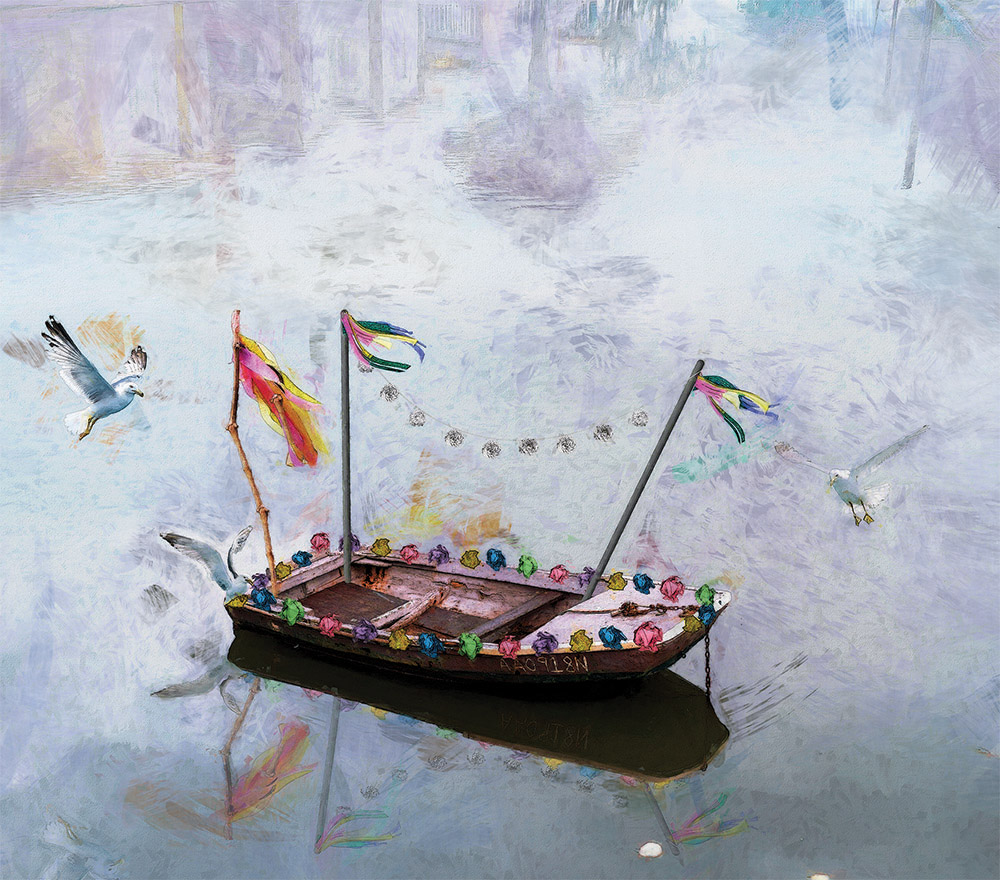
“Miss Helen,” Fernand said. Daylight had crept back like the tide. Was this the next day or some other?
She nodded up at him, a little round stone.
He picked her up from the bed gently, helped her wrap her sinewy arms around his neck. They pressed up against his ruff, dark against the pale fronds.
“I’m sorry,” she said.
“S’okay.”
“I’m so sorry.”
He carried her through the house. Everything was in its place, everything was clean, all the picture frames hung square. Steven would be happy. She was happy. Fernand pushed open the French doors with his middle limbs, stepped out onto the porch with her.
“Happy Mardi Gras,” he said.
“It’s beautiful,” she said, and it was. He’d built it, true to her pictures, on the frame of his little flat-bottomed boat, all paper flowers, bright streamers, tin-foil sparkles, tawdry and busy and perfect.
“Thank you,” she gasped, because she hadn’t known she was lonely either. He carried her up to a kitchen chair decked in scarlet flowers, crouched beside her. Seagulls wheeled overhead. The sky was clear and blue and bounced up off the shallow water. Civilization was a long way away and a long time ago, but would go on without her, had been going on without her, and she knew that was as it ought to be. Somewhere in the distance a band was playing, and the saints were marching, marching in.


